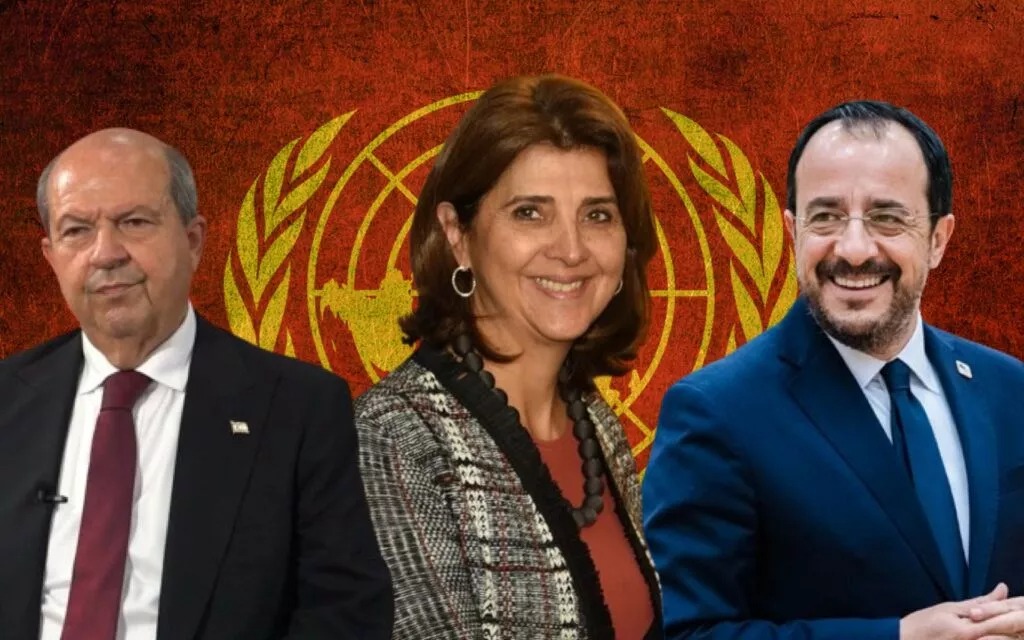María Ángela Holguín is en route to Nicosia for her first encounter with the realities of the Cyprus issue, as low expectations surround the renewed effort to address the long-standing matter that has preoccupied the island for five decades.
Tasked with restarting talks on the Cyprus issue, Holguín is prepared to work to achieve tangible results.
The United Nations’ new attempt to facilitate a restart in Cyprus, initially through talks and with the prospect of sustained dialogues over time, will once again hinge on the details and how both sides plan to act when they engage with all stakeholders within and outside Cyprus.
What we know so far
From her initial contacts, María Ángela Holguín Cuéllar has demonstrated her commitment to the process, aiming for more substantial progress than her predecessors. Olguin is expected to arrive in Cyprus tomorrow and has scheduled her first meetings with President Christodoulides on Tuesday, followed by discussions with Ersin Tatar.
Beyond these high-level meetings, Holguín has engaged with various groups and social entities from both communities to gather positions, perspectives, and assessments. Notably, the key aspect to watch is the choice of individuals and groups with whom Holguín will meet, as these encounters will provide insights into intentions and potential alignments.
Attention to diplomatic manoeuvres
The success of the process will largely depend on how Holguín navigates between the two sides and how both parties handle the discussions. Observers are closely monitoring her moves and interactions with keen interest. The diplomatic circles are particularly curious about Holguín’s approach and how she manages relations with each side.
Regarding dialogue:
- The Greek Cypriot side appears ready to discuss the continuation of talks from where they left off in Crans Montana in 2017, based on United Nations resolutions.
- In contrast, the Turkish Cypriot side seems to be moving in the opposite direction, raising questions about Ersin Tatar’s stance in his meeting with Holguín on Tuesday.
Breaking the deadlock scenarios
Concerning the deadlock resolution:
- If concessions are expected from the Greek Cypriot side to shift the dialogue away from the current UN resolutions, progress is unlikely.
- Alternatively, if pressure is exerted on the Turkish Cypriot/Turkish side to base the dialogue on UN resolutions, it could be a significant development with potential positive outcomes.
After the initial round of meetings with the two leaders and organised groups, the possibility of a second round of talks or a joint meeting with both leaders is not ruled out.
Contemplating representation
According to available information, María Ángela Holguín intends to visit Cyprus with her own small team rather than relying solely on the Cypriot team operating under Collin Stewart. This move, if implemented, is seen as significant in diplomatic circles, as it reflects Holguín’s intention to maintain an active role in the process even when she is not on the island.
Focus on capitals
While Holguín’s meetings in Cyprus are crucial, her visits to four different capitals for discussions on the Cyprus issue add another layer of importance. Scheduled visits to Ankara, Athens, London, and Brussels are aimed at engaging with the three guarantor powers and the EU, emphasising the role of Turkey in determining the overall success of the effort.
Brussels, in particular, is of interest, as Holguín is set to meet with Josep Borrell, who has expressed a keen interest in developments.
Push for more flexibility
While it is clear that Nicosia expects the Turkish side to demonstrate more flexibility and adaptability, a similar approach does not seem to be present among foreign stakeholders, particularly the British. They insist and appear to anticipate more flexibility from the Greek Cypriot side.
The recent interview with the British High Commissioner, Irfan Siddiq, in the Turkish Cypriot newspaper “Yeni Duzen,” sheds light on London’s approach to the current efforts in Cyprus. Siddiq indicated that “the Greek Cypriot side accepted the description of the terms of reference from the personal envoy of the UN Secretary-General. Although they believe that her duty should focus on a bicommunal, bizonal federation, they did not clearly state this in the terms of reference.”
Continuing, he stated: “Of course, they want to return to a bicommunal, bizonal federation, but they have shown this flexibility, and I hope that when the envoy arrives, we will see more flexibility on the issue of confidence-building measures.”
London’s interpretation, possibly echoed by other capitals, suggests that Nicosia appeared “wise enough” in this instance to be flexible enough to secure the appointment of an envoy and restart efforts in Cyprus.
Notably, there is a subtle hope for a similar approach in the future, hinting at a departure from the insistence of the Greek Cypriot side on the basis of the UN resolutions.
In essence, they indirectly advocate for their earlier proposal that a middle ground should be sought between the positions expressed by the two sides. This middle ground would be something between a federal solution, in line with the UN resolutions, and the two-state solution advocated by the Turkish side.
The second point of flexibility demonstrated by the Greek Cypriot side, according to international assessments, was its willingness to forego insisting on specific designations for the envoy, as had happened in the past.
The lack of insistence on whether she would be a “personal envoy” or a “special envoy” is seen as contributing to Antonio Guterres’ decision to appoint Holguín as his envoy to Cyprus.






